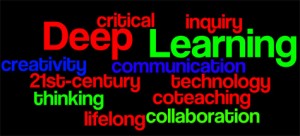 In a recent post to the American Association of School Librarians (AASL) Forum, Dr. David Loertscher pointed us to a Mindshift blog post by Tina Barseghian. Her piece focused on measuring deeper learning.
In a recent post to the American Association of School Librarians (AASL) Forum, Dr. David Loertscher pointed us to a Mindshift blog post by Tina Barseghian. Her piece focused on measuring deeper learning.
In the Mindshift blog post, Dr. James Pellegrino defined deeper learning as a way to learn processes that transfer and make knowledge useful in new situations. Dr. Linda Darling-Hammond, professor of education at the Stanford and advocate for education reform, is also cited in Barseghian’s post. Darling-Hammond states that deeper learning involves problem solving in collaboration with others: “Collaboration is a skill not a deficit.”
On the AASL Forum, David asked how school librarians are shifting their practices, particularly in Common Core State Standards learning experiences, “to concentrate on deeper learning rather than the old superficial factual knowledge acquisition that has been commonplace.” He also asked what school library educators are doing to teach this shift in preservice preparation courses. To answer David’s questions, I would like share my New Year’s resolutions.
I will continue to work with the school, public, and academic librarians in Denton, Texas as we inquire about how to best support young people in our community in developing lifelong literacy skills through deep learning. As a first step in the 2012-2013 academic year, the Denton Inquiry 4 Lifelong Learning team is facilitating a year-long book study of Drs. Carol Kuhlthau, Leslie Maniotes, and Ann Caspari’s book Guided Inquiry Design: A Framework for Your School (Libraries Unlimited, 2012).
In my work as a school librarian educator, I will continue to push the preservice candidates with whom I am privileged to learn toward facilitating inquiry learning and technology integration through classroom-library instructional partnerships that position librarians as leaders in “deeper learning” reform efforts in their schools.
Whenever the opportunity arises, I will write letters to the editors of the newspapers in my communities to inform readers of the potential of professional school librarians to positively impact 21st-century students’ learning and teachers’ teaching.
And I will continue to coproduce this blog with my colleagues Drs. Sue Kimmel, Melissa P. Johnston, and Judy Kaplan to share news and views to further conversations with our preservice librarian candidates and practicing librarians regarding our role in building cultures of collaboration in our schools.
As a practicing school librarian or school librarian educator, how will you resolve to improve the practice of our profession in 2013?
References
Barseghian, Tina. (2012, Sept. 13). How do we define and measure deeper learning? Mindshift Blog. 31 Dec. 2012.
Word Cloud. Wordle.net. http://wordle.net

Glad to read this information and think about how I can contribute to library and librarian issues. (Retired school librarian)
At our university, we use Loertscher’s “ban those bird units” as a rallying cry. In courses that co-mingle academic, public, and school librarians alongside preservice middle/high school teachers, we keep working on how we can go beyond bibliographic instruction and into transformative learning. In our classes, for example, all of those groups look at Common Core: what does it mean for school librarians? Public librarians? Classroom teachers? What are the potential implications for academic librarians’ instructional practice? Where are the connections? To do this, we have to push past facile guidelines and our past experiences as teachers and students. Those conversations can be tricky and, at times, uncomfortable. As my teaching colleague says, “You can’t push away uncertainties; you have to push through them.”
Pingback: New Year's Resolution: Deep Learning through Sc...
Pingback: New Year's Resolution: Deep Learning through Sc...